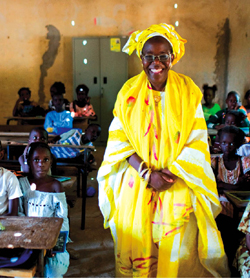The Teflon Grandmother
In "retirement," Viola Vaughn has discovered her life's work: helping Senegal's girls keep the negative from sticking
In “retirement,” Viola Vaughn has discovered her life’s work: helping Senegal’s girls keep the negative from sticking
by Suzanne Guillette
In 2001, Viola Vaughn (Ed.D., Health Education, ’84) moved with her husband, jazz musician Sam Sanders, from Detroit to a rural village in Senegal, where she had previously worked as an education and health consultant. Her plan: to spend her retirement years home-schooling her five grandchildren, who’d been left in her care after her daughter unexpectedly passed away. Shortly after they arrived, though, Sanders died of Black Lung disease, leaving Vaughn not only bereft but with the full weight of raising a young a family on her shoulders.
So when one of her granddaughters’ classmates, a little girl named Mame Gueda, asked for help with her school work, Vaughn initially said no. Certainly she knew that in Senegal, a child who fails twice within the same educational period gets expelled from the entire school system, losing almost any chance of escaping from poverty. She knew, too, that the policy has a disproportionately harsh effect on girls: For every 60,000 girls that enter the first grade, only 200 will finish high school—and of those, only half will go on to college.
But those numbers were why Vaughn resisted Mame Gueda’s entreaties. If word got out that she was helping one little girl, she’d soon have a mob of them at her door.
Which, ultimately, is exactly what happened.
The day after Vaughn agreed to work with “her and her alone,” Mame Gueda showed up with three of her friends. The next week, there were 20 girls at Vaughn’s doorstep.
Nine years later, Vaughn’s reluctant teaching has blossomed into 10,000 Girls, the non-profit she founded as a result of Mame Gueda’s persistence. Offering tutoring and entrepreneurial opportunities for young girls and women across Senegal, 10,000 Girls counts 3,383 current students and graduates from its 43 programs, spanning 11 towns and three regions. The organization now boasts a student pass rate of 92 percent, compared to just 28 percent for UNESCO in the same region.
Vaughn’s top priority and signature method has been to empower girls, not only to learn, but also to act as entrepreneurs, a skill that will serve them well as adults competing in the Senegalese economy.
“That’s from Bloom’s Taxonomy, which I learned about at Teachers College,” says Vaughn, who received the College’s Distinguished Alumni Award this past spring. “The concept of putting an action to every objective.”
As part of the 10,000 Girls structure, the girls are teachers and decision-makers, as well as students. They tutor one another in subjects such as addition or multiplication. They meet regularly to discuss the program’s curriculum and staffing.
The students in Vaughn’s program have been selling baked goods from the very beginning to support the program, and more recently, a group of students from a neighboring village bought land and are currently exporting hibiscus to the United States, so that they, too, can participate in Vaughn’s program.
Embracing the idea that change comes from within, the girls even decided to change their own consumption patterns after watching the documentary “An Inconvenient Truth.” They have committed to not littering and to keeping their areas trash-free. Once they’ve “walked the walk,” they will introduce these ideas to their families.
“They know what they need,” Vaughn says, describing her role as more facilitator than authoritarian schoolmaster. “I am what they call the ‘Teflon Grandmother.’ I keep the negative from sticking to the girls.”
That includes her very first student, Mame Gueda, who, as she begins her senior year in high school is, not surprisingly, the top student in her class.
About herself, Vaughn says, “This is not something I wanted to do initially—but it’s the best job I ever had. I’d worked for 20 years on issues of family planning, nutrition and HIV prevention. I thought that was my service to humanity. Now, I know it was just a preview of my real work.”
Published Wednesday, Dec. 15, 2010
